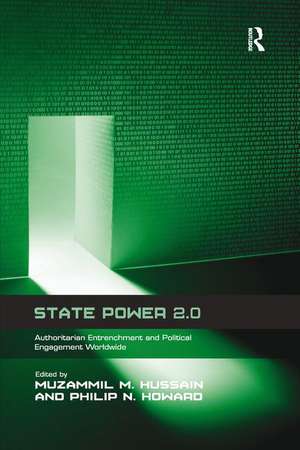State Power 2.0: Authoritarian Entrenchment and Political Engagement Worldwide
Autor Muzammil M. Hussain Editat de Philip N. Howarden Limba Engleză Paperback – 9 sep 2016
| Toate formatele și edițiile | Preț | Express |
|---|---|---|
| Paperback (1) | 462.60 lei 43-57 zile | |
| Taylor & Francis – 9 sep 2016 | 462.60 lei 43-57 zile | |
| Hardback (1) | 1055.38 lei 43-57 zile | |
| Taylor & Francis – 6 dec 2013 | 1055.38 lei 43-57 zile |
Preț: 462.60 lei
Nou
Puncte Express: 694
Preț estimativ în valută:
88.55€ • 96.21$ • 74.43£
88.55€ • 96.21$ • 74.43£
Carte tipărită la comandă
Livrare economică 21 aprilie-05 mai
Preluare comenzi: 021 569.72.76
Specificații
ISBN-13: 9781138250109
ISBN-10: 1138250104
Pagini: 208
Dimensiuni: 156 x 234 x 11 mm
Greutate: 0.29 kg
Ediția:1
Editura: Taylor & Francis
Colecția Routledge
Locul publicării:Oxford, United Kingdom
ISBN-10: 1138250104
Pagini: 208
Dimensiuni: 156 x 234 x 11 mm
Greutate: 0.29 kg
Ediția:1
Editura: Taylor & Francis
Colecția Routledge
Locul publicării:Oxford, United Kingdom
Notă biografică
Muzammil M. Hussain is Assistant Professor of Global Media Studies at the University of Michigan’s Department of Communication Studies, and Faculty Associate at the Institute for Social Research’s Center for Political Studies. He tweets from @m_m_hussain. Philip N. Howard is a professor in the School of Public Policy at Central European University . His writings appear at and he tweets from @pnhoward.
Recenzii
’Interest in how governments use, manipulate, or even shut down the internet in the service of state power has been growing at a fever pitch. This collection provides an insightful framework for understanding these dynamics as well as an impressive array of individual chapters that will undoubtedly become an essential scholarly resource in this area for years to come.’ Michael Xenos, University of Wisconsin-Madison, USA ’When Time magazine named You as its person of the year in 2006, few could foresee how swiftly both authoritarian and democratic states would learn to control political participation on the internet. This landmark comparative study brings to light the tactics states are using to protect their authority and manage dissent. Amid huge claims about the power of technology to drive political change, this volume provides concrete analysis across a range of national media ecologies and hundreds of events. Paradoxically, by bringing us back down to earth the authors help us understand better how our voices might be heard and change realised.’ Ben O’Loughlin, Royal Holloway, University of London, UK
Cuprins
Introduction: State Power 2.0, Muzammil M. Hussain, Philip N. Howard, Sheetal D. Agarwal; Part 1 Information Infrastructure and Social Control; Chapter 1 Origins of the Tunisian Internet, Katherine Maher, Jillian C. York; Chapter 2 The State of Digital Exception: Censorship and Dissent in Post-Revolutionary Iran, BabakRahimi; Chapter 3 Information Infrastructure and Anti-Regime Protests in Iran and Tunisia, MatthewCarrieri, Ronald J.Deibert, Saad OmarKhan; Chapter 4 Digital Occupation in Gaza’s High-Tech Enclosure, HelgaTawil-Souri; Chapter 5 Leveraged Affordances and the Specter of Structural Violence, DavidKarpf, StevenLivingston; Part 2 Digital Media and Political Engagement; Chapter 6 Technology-Induced Innovation in the Making and Consolidation of Arab Democracy, ImadSalamey; Chapter 7 Al-Masry Al-Youm and Egypt’s New Media Ecology, David MFaris; Chapter 8 Communicating Politics in Kuwait, FahedAl-Sumait; Chapter 9 Social Media and Soft Political Change in Morocco, MohammedIbahrine; Chapter 10 Leninist Lapdogs to Bothersome Bloggers in Vietnam, CatherineMcKinley, AnyaSchiffrin; Chapter 11 Dynamics of Innovation and the Balance of Power in Russia, GregoryAsmolov; Chapter 12 Anonymous vs. Authoritarianism, Jessica L.Beyer;
Descriere
What causes state-powers to block internet access, disable digital networks or even shut off internet access? How is it done, what is the impact and how do dissidents attempt to fight back? In this timely and accessible volume a collection of high profile, international scholars answer these key questions using cases from Israel, Iran, Russia, Morocco, Vietnam and Kuwait and assess the political economy of the actors, institutions and regimes involved and effected by the state-management and control of digital networks.
